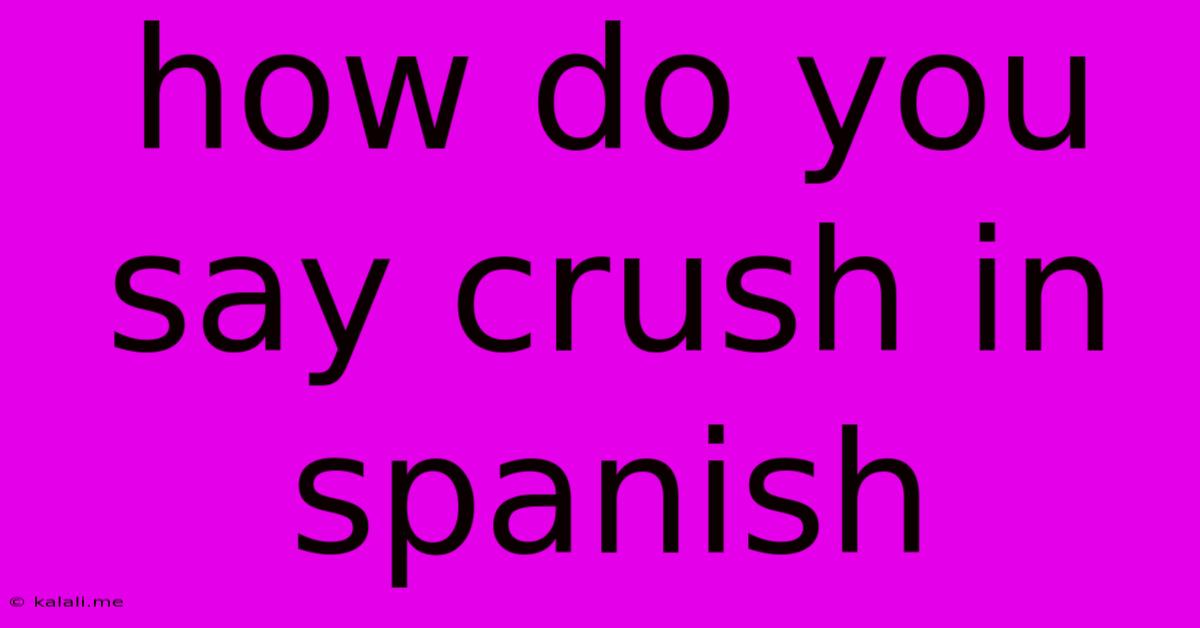How Do You Say Crush In Spanish
Kalali
Jun 05, 2025 · 3 min read

Table of Contents
How Do You Say "Crush" in Spanish? More Than Just "Crush"!
So, you have a crush and you want to talk about it in Spanish? It's not as simple as a direct translation, as the nuances of expressing a crush vary depending on the intensity of your feelings and the context. This article will explore several ways to say "crush" in Spanish, helping you choose the perfect phrase for your situation. This guide will cover vocabulary, context, and even some cultural considerations to ensure you communicate effectively.
Understanding the Nuances of "Crush"
Before diving into the Spanish translations, let's clarify what we mean by "crush." A crush usually implies a fleeting, intense infatuation, often characterized by admiration, excitement, and maybe a bit of nervousness. It's not necessarily the same as being in love. This distinction is important for choosing the right Spanish word or phrase.
Common Ways to Say "Crush" in Spanish:
Here are several options, each carrying slightly different connotations:
-
Enamoramiento: This word refers to the state of being in love, but in its early stages. It captures the initial excitement and intensity of a new crush, implying a strong attraction but perhaps lacking the depth of a long-term relationship. This is a good choice if your crush is significant and you feel a strong emotional connection. -
Querer mucho a alguien: This translates literally to "to love someone very much," but it’s a softer way to express a crush. It emphasizes affection and liking without the intensity suggested by "love." This phrase is suitable if your feelings are more gentle and less intense. -
Tener un flechazo: This literally translates to "to have an arrow strike," implying a sudden and powerful attraction, a "love at first sight" type of crush. This phrase is perfect for describing a sudden, overwhelming crush. -
Estar enamorado/a de alguien: This means "to be in love with someone." While it's stronger than a simple crush, it can be used to describe an intense crush, especially if the feelings are quite strong and overwhelming. However, be mindful of the implications—it might suggest stronger feelings than you intend. -
Me gusta mucho: This translates to "I like him/her a lot." This is a casual and less intense way to express attraction, suitable for a mild crush or when you're not ready to reveal stronger feelings. -
Estoy loco/a por...: This translates to "I'm crazy about..." and expresses a strong infatuation or obsession. Use this only if your feelings are very intense and bordering on obsessive.
Context is Key:
The best way to say "crush" in Spanish depends heavily on the context. Consider:
- Who are you talking to? A close friend might understand a more casual expression, while a more formal setting requires a more subtle approach.
- How strong are your feelings? A mild crush calls for a gentler phrase, while an intense infatuation demands a more expressive one.
- What is the purpose of your statement? Are you confessing your feelings, casually mentioning your attraction, or simply describing your situation to a friend?
Cultural Considerations:
Spanish-speaking cultures vary in their expressions of affection. In some cultures, openly expressing a crush might be considered bold, while in others, it might be more commonplace. Be mindful of the cultural context and adapt your language accordingly.
By considering the nuances of the word "crush" and choosing the appropriate phrase based on context and intensity, you can confidently and accurately express your feelings in Spanish. Remember, practice makes perfect! Try using these phrases in different situations and observe how they are received. Good luck!
Latest Posts
Latest Posts
-
Why Does My Airplay Keep Disconnecting
Jun 06, 2025
-
How To Put Down Wood Flooring
Jun 06, 2025
-
How To Clean A Shower Drain That Cant Be Removed
Jun 06, 2025
-
Best Kayak For Class 2 Rapids
Jun 06, 2025
-
How Long For Latex Paint To Dry
Jun 06, 2025
Related Post
Thank you for visiting our website which covers about How Do You Say Crush In Spanish . We hope the information provided has been useful to you. Feel free to contact us if you have any questions or need further assistance. See you next time and don't miss to bookmark.